|
|
|
Sort Order |
|
|
|
Items / Page
|
|
|
|
|
|
|
| Srl | Item |
| 1 |
ID:
129259
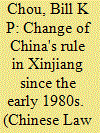

|
|
|
|
|
| Publication |
2012.
|
| Summary/Abstract |
During the reform era, the Chinese government's policies in Xinjiang have changed from accommodating to hardening. The alienation of ethnic minorities caused by the Cultural Revolution necessitated loosening of controls on cultural and religious freedom. With increasing incidents of disturbance leading up to the late 1980s, however, the Chinese government became more coercive on internal security and more generous with economic and development assistance. The global war against Islamic terrorism allowed China to justify a crackdown on the re-sistance in Xinjiang. The 2009 Ürümqi riot proved that the government's policies had failed to stabilize the region, but the Chinese government's countermeasure was to step up, not drop, the repressive policies
|
|
|
|
|
|
|
|
|
|
|
|
|
|
|
|
| 2 |
ID:
129261
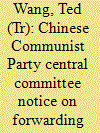

|
|
|
|
|
| Publication |
2012.
|
| Summary/Abstract |
To the Xinjiang Autonomous Region Party Committee and the party committees of all provinces, municipalities, and autonomous regions; the party committees of all large military districts, provincial military districts, and field armies; all central ministries and commissions; the party committees of various ministries and commissions of state organs; all general headquarters of military commissions; the party committees of all services of the armed forces; and the party committees of all people'sorganizations:The "Central Secretariat Summary of Discussions on Work Issues inXinjiang"1is hereby issued to you. Please implement it and carry it out in connection with actual circumstances. This document is simultaneously issued to the Party committees of all provinces, municipalities, and autonomous regions for reference. On the morning of July 6, 1981, issues in the work in Xinjiang were once again discussed in accordance with the Resolutions on a Number of Historical Questions in the Party since the Founding of the People's Republic passed by the Sixth Plenary Session of the Eleventh Party
|
|
|
|
|
|
|
|
|
|
|
|
|
|
|
|
| 3 |
ID:
129267
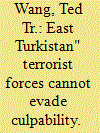

|
|
|
|
|
| Publication |
2012.
|
| Summary/Abstract |
Terrorism is a major hazard in today's world and poses an enormous threat to the international community's peace, security, and order. Over the years, especially since the 1990s, "East Turkistan" forces in and outside China have, for the purpose of establishing an "East Turkistan State," planned and organized a series of bombings, assassinations, arsons, poisonings, assaults, and other terrorist incidents that have taken place in China's Xinjiang and relevant countries, causing serious harm to the lives and property of China's various ethnic peoples and to social stability and posing a threat to peace and stability of the relevant countries and regions
|
|
|
|
|
|
|
|
|
|
|
|
|
|
|
|
| 4 |
ID:
129263
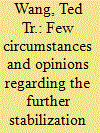

|
|
|
|
|
| Publication |
2012.
|
| Summary/Abstract |
Speech made by Comrade Jiang Zemin at a symposium held during the Sixth Plenary Meeting of the Thirteenth Chinese Party Congress. Today we invite comrades from ethnic border regions and from the Shenyang, Beijing, Lanzhou, and Chengdu military districts who are participating in the present central (committee) plenary meeting to attend a symposium, and we also invite comrades from the various de- partments of the Party Center and the relevant state council departments participating in the plenary meeting to attend in order to study the matter of further stabilizing the ethnic border regions. This indicates that the Party Center, the state council, and the Central Military Commission show great concern for and attach importance to the work in the ethnic border regions
|
|
|
|
|
|
|
|
|
|
|
|
|
|
|
|
| 5 |
ID:
129262


|
|
|
|
|
| Publication |
2012.
|
| Summary/Abstract |
To the Government of the Xinjiang Autonomous Region: The Summary of Discussions on the Work of Opening Up Xinjiang has been perused and approved by Comrade Gu Mu. In line with the opinions of leading comrades, it is hereby printed and issued to you. Please study it and carry it out. Ever since the third plenary session of the eleventh party congress, Xinjiang has been politically stable and united and economic construction has developed rapidly. The industrial and agricultural gross output value of 1986 has more than doubled that of 1980. Agriculture and animal husbandry have had bumper harvests for ten consecutive years, and the region is more than self-sufficient in cereals, cotton, oil, and sugar crops. Import trade, use of foreign currency, and the tourist business have made significant progress. Airline and railway communications and transport conditions have seen constant improvement. Xinjiang has abundant resources and a vast, sparsely populated territory and has great potential for developing the economy and supporting national construction.
|
|
|
|
|
|
|
|
|
|
|
|
|
|
|
|
| 6 |
ID:
129264
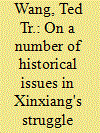

|
|
|
|
|
| Publication |
2012.
|
| Summary/Abstract |
This is part of a supplementary address by Comrade Jiang Zemin at the Central Committee's Taiwan work meeting. For some time already, ethnic separatists in China's Xinjiang and outside its borders have been rampantly active and have brought serious harm to Xinjiang' stability and development. We must be highly alert and take strict precautions. Our leading cadres and especially high-placed cadres must inform themselves about both the historical and current circumstances of the so-called East Turkistan issue touted by Xinjiang's ethnic separatist forces. The Xinjiang region has since ancient times maintained close contacts with the motherland's Central Plains. From the Han dynasty up to the mid and late Qing dynasty, Xinjiang and its surrounding regions came under the general designation "western regions." In the second Shenjue year of Han Emperor Xuandi, or 60 by the Gregorian calendar, the western regions were officially incorporated into the motherland's territory. During the Sui and Tang dynasties, the central government continued to exercise administration over the western regions, and Tang Emperor Taizong substantially strengthened its jurisdiction over that vast region.
|
|
|
|
|
|
|
|
|
|
|
|
|
|
|
|
| 7 |
ID:
129265
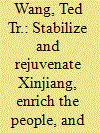

|
|
|
|
|
| Publication |
2012.
|
| Summary/Abstract |
I have come to Xinjiang this time mainly to do some investigating and research for implementing the scientific concept of development, promoting economic and social development, and enhancing Party construction. What I have seen and heard over the past few days deeply impresses me. The last time I came to Xinjiang was in June 2001. Returning again after more than five years, we are happy to see that gratifying achievements have been made in Xinjiang's economic and social development and that significant changes have occurred in the appearance of towns and countryside. These are fairly outstanding in the following respects. First, the economy has maintained fairly rapid growth. Last year's gross domestic product (GDP) in the region reached RMB260,900,000,000, an increase of 10.9 percent over the previous year, and in the first half of this year GDP in the region reached RMB105,200,000,000, rising 11.2 percent over the same period last year. Second, there have been swifter adjustments in the economic structure, with accelerated open-ing up of competitive resources and stepped-up development of special industries.
|
|
|
|
|
|
|
|
|
|
|
|
|
|
|
|
| 8 |
ID:
129266


|
|
|
|
|
| Publication |
2012.
|
| Summary/Abstract |
Speech delivered by Hu Jintao at the central Xinjiang work conference on May 17, 2010. This central Xinjiang work conference is a very important meeting held by the Party center and the state council at a time when our country has entered a key period in the overall construction of a moderately prosper- ous society and when Xinjiang's development and stability are facing major opportunities and challenges. The main tasks of this meeting are to comprehensively implement the spirit of the Party's Seventeenth Congress and of the Third and Fourth Plenary Sessions of the Seventeenth Congress, thoroughly implement the scientific development concept, summarize the achievements and experience of Xinjiang's work of development and stability, study and make arrangements for work in Xinjiang now and for some time to come, and promote leaping advances and long-term stability in Xinjiang.
|
|
|
|
|
|
|
|
|
|
|
|
|
|
|
|
|
|
|
|
|